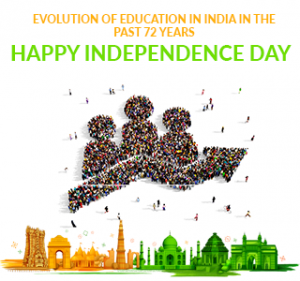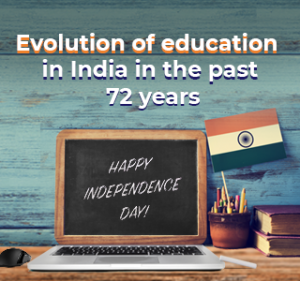 In the following years, the education system started getting influenced by various institutions. During the late nineteenth century, the Theosophical Society of India and Rama Krishna Mission started to merge the western ideals of education with the Indian roots to inspire the students and make them accepted universally. Intellectuals of various nationalities came together and helped shape the education system.
In the following years, the education system started getting influenced by various institutions. During the late nineteenth century, the Theosophical Society of India and Rama Krishna Mission started to merge the western ideals of education with the Indian roots to inspire the students and make them accepted universally. Intellectuals of various nationalities came together and helped shape the education system.
 Indian Independence day - 2019[/caption]
Indian Independence day - 2019[/caption]
 Evolution of education in India - from Chalk to Tablets[/caption]
• Experiential Learning: As it is evident by the name, experiential learning is the process of learning through doing or experience, and is more specifically defined as "learning through reflection on doing. Learning only produces good results when learners have the desire to absorb the knowledge. Therefore, experiential learning comprises a hands-on approach to education that goes beyond the theoretical aspect and a classroom and strives to bring a more involved way of learning.
Also Read: Present & Future of Online Education in India
• Peer Learning: Peer learning has become a part of an active learning strategy in a lot of Universities and B-Schools. This form of pedagogy encourages students to interact with their classmates/peers and learn from each other beyond classroom without any supervising authority. This creates an environment of open communication which is highly crucial for learning. Research has shown that students, who engage in an environment of free communication, perform better academically.
• The Rise of Ed-Tech: Starting from the past decade, the new generation of learner is looking for courses which are experiential and interactive in nature and facilitate authentic skill development. This is where the Edtech is making its mark. According to a report by Google & KPMG, Online education has the potential to touch $1.96 billion by 2021 as everyone, from school going students to MBA aspirants to CXOs of multinational corporations and entrepreneurs, is a potential learner.
Let us consider the examples of two distinct Edtech start-ups. One of the app based Edtech company has moved in the direction of making learning fun for school going children. On the other end of the spectrum, Edtech startups in higher-education arena are partnering with premium Indian and international B-Schools bringing quality learning within the reach of working professionals.
The evolution of communication, cheaper internet, gamification, AI & ML powered learning platforms are some of the reasons behind the changing face education in the country and globally. The smartphone revolution has also provided wings for the Edtech to fly. Educators are now using smartphones as a significant tool for imparting knowledge.
Conclusion:
The education landscape of India has evolved considerably since we achieved our Independence. The intervention of technology has made it easier and much more insightful than it ever was. The benefits of imparting relevant education have been understood by the governments which have done their bit to boost the existing system for all sections of the society.
More Information:
Benefits of Online Education
Online Learning vs. Classroom Learning
Present & Future of Online Education in India
Scope & Opportunities for Online Learning in India
Different Technical Requirements for Online Learning
Evolution of education in India - from Chalk to Tablets[/caption]
• Experiential Learning: As it is evident by the name, experiential learning is the process of learning through doing or experience, and is more specifically defined as "learning through reflection on doing. Learning only produces good results when learners have the desire to absorb the knowledge. Therefore, experiential learning comprises a hands-on approach to education that goes beyond the theoretical aspect and a classroom and strives to bring a more involved way of learning.
Also Read: Present & Future of Online Education in India
• Peer Learning: Peer learning has become a part of an active learning strategy in a lot of Universities and B-Schools. This form of pedagogy encourages students to interact with their classmates/peers and learn from each other beyond classroom without any supervising authority. This creates an environment of open communication which is highly crucial for learning. Research has shown that students, who engage in an environment of free communication, perform better academically.
• The Rise of Ed-Tech: Starting from the past decade, the new generation of learner is looking for courses which are experiential and interactive in nature and facilitate authentic skill development. This is where the Edtech is making its mark. According to a report by Google & KPMG, Online education has the potential to touch $1.96 billion by 2021 as everyone, from school going students to MBA aspirants to CXOs of multinational corporations and entrepreneurs, is a potential learner.
Let us consider the examples of two distinct Edtech start-ups. One of the app based Edtech company has moved in the direction of making learning fun for school going children. On the other end of the spectrum, Edtech startups in higher-education arena are partnering with premium Indian and international B-Schools bringing quality learning within the reach of working professionals.
The evolution of communication, cheaper internet, gamification, AI & ML powered learning platforms are some of the reasons behind the changing face education in the country and globally. The smartphone revolution has also provided wings for the Edtech to fly. Educators are now using smartphones as a significant tool for imparting knowledge.
Conclusion:
The education landscape of India has evolved considerably since we achieved our Independence. The intervention of technology has made it easier and much more insightful than it ever was. The benefits of imparting relevant education have been understood by the governments which have done their bit to boost the existing system for all sections of the society.
More Information:
Benefits of Online Education
Online Learning vs. Classroom Learning
Present & Future of Online Education in India
Scope & Opportunities for Online Learning in India
Different Technical Requirements for Online Learning
We offer courses jointly with world-leading institutes and corporates. Talentedge partners with top Indian & International institutes including IIMs , XLRI, MICA, and also with renowned corporates like Society of Human Resource Management (SHRM) and others.
Will get in touch with you soon


 ✕
✕